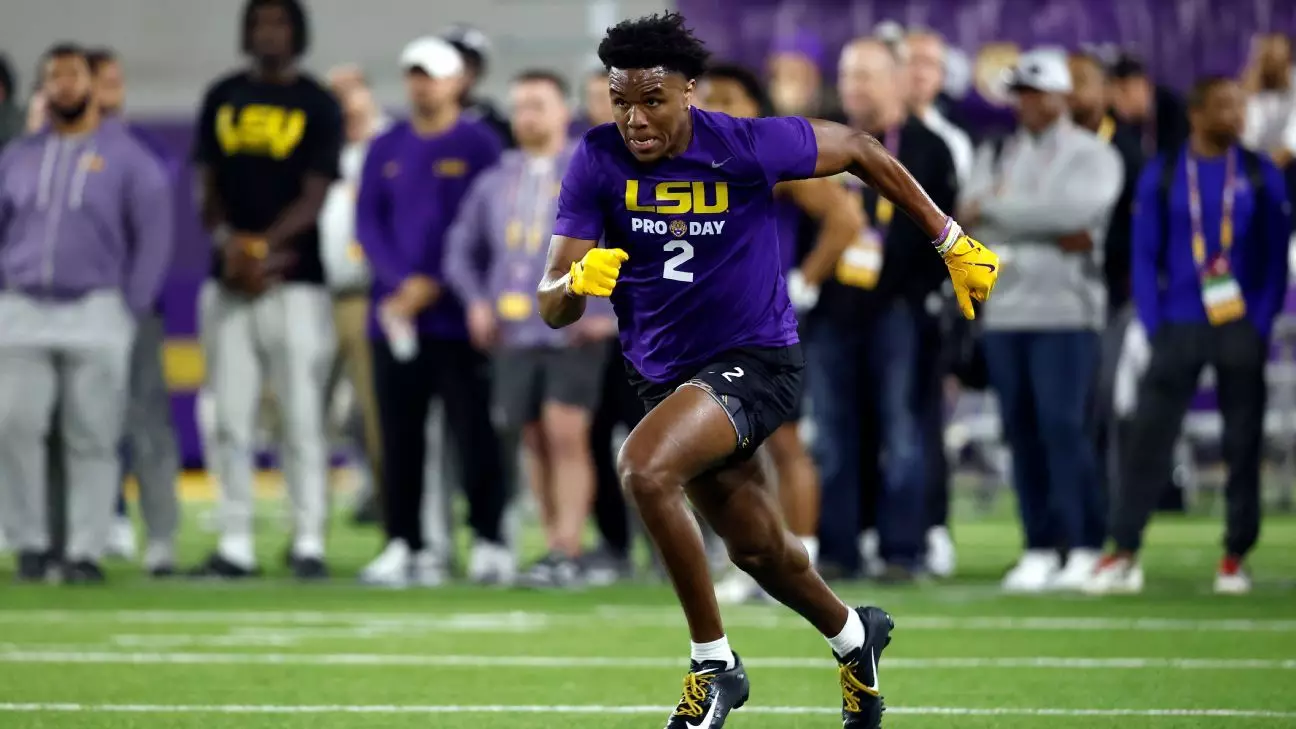The recent passing of former LSU wide receiver Kyren Lacy casts a profound shadow over the sports community. His death, reported to have been a suicide while allegedly running from authorities, draws attention not only to the individual tragedy of a budding athlete’s life but also to the significant issues surrounding mental health and the pressures faced by young professionals in high-stakes environments. At just 24 years old, Lacy’s story encapsulates the harsh reality that success in sports does not shield individuals from personal struggles.
The Incident That Shook a Community
On a fateful Saturday night in Houston, a family emergency escalated when Lacy reportedly discharged a firearm during a heated argument. According to the Harris County sheriff’s report, his subsequent flight from the scene culminated in a car crash, after which authorities discovered him critically injured in his vehicle. The report suggests that Lacy died from a self-inflicted gunshot wound, triggering an immediate flood of grief and disbelief among teammates, coaches, and fans. This tragic series of events raises profound questions about the circumstances leading to such a drastic action and the overlooked signs of mental distress.
Behind the Facade of Athletic Success
Lacy was not merely an athlete but a promising talent in college football, with aspirations that reached into the NFL. His 2022 season was monumental; the receiver achieved significant milestones, including leading his team with 58 receptions and nine touchdowns. However, beneath the accolades lay an unsettling history of turmoil. Just weeks prior to his death, Lacy faced serious legal charges linked to a tragic vehicle accident that resulted in the death of a 78-year-old man in Louisiana. Although he turned himself in to the authorities and was released on bail, the weight of those allegations must have weighed heavily on his mind.
The distressing connection between Lacy’s tumultuous trajectory and the tragic conclusion of his story opens up discussions surrounding the mental health of athletes. Often, these individuals are placed on pedestals, celebrated for their physical abilities while their emotional and mental hurdles go unnoticed. Reports indicate that Lacy’s father, Kenny Lacy, took to social media to plead with parents to prioritize their children’s mental health, suggesting a crucial immediate need for increased public awareness and proactive measures for support.
The Aftermath of the Tragedy
In the aftermath of Lacy’s passing, the sports world, and particularly LSU, expressed deep sorrow at the loss of a young talent. LSU President William F. Tate IV stated, “We are saddened to learn of the tragic passing of former LSU football student-athlete Kyren Lacy. Our thoughts and prayers are with his family and loved ones.” These campaigners highlight a larger narrative often overlooked—the ripple effect that such tragedies have on families, communities, and institutions.
It’s apparent that the pressure surrounding athletes, especially those with ambitions of reaching professional status, can become unbearable. With dreams of playing in the NFL looming on the horizon, young players like Lacy often find themselves in situations where they feel they must manage both external expectations and internal struggles simultaneously. This case exemplifies the crucial urgency for athletic programs to implement comprehensive mental health support systems, particularly for those navigating personal crises alongside professional aspirations.
The Call for Change
Kyren Lacy’s story serves as a stark reminder of the devastating consequences that can arise from neglecting mental health discussions within the sports community. The call for attention to athletes’ mental wellbeing is growing louder as more cases echo the tragic sentiment embedded in Lacy’s life. Athletes need robust support networks tailored to their unique experiences and pressures, ensuring that early warning signs are addressed and discussed openly.
Furthermore, the legal and social ramifications following incidents like Lacy’s suggest an urgent need for reform in how young adults are educated about mental health and the importance of seeking help when needed. There must be a shift in narrative—from viewing vulnerability as a weakness to embracing it as a necessary strength. As we reflect on Lacy’s life and the struggles he faced, we must come together as a society to foster understanding, empathy, and resilience in future generations of athletes.

